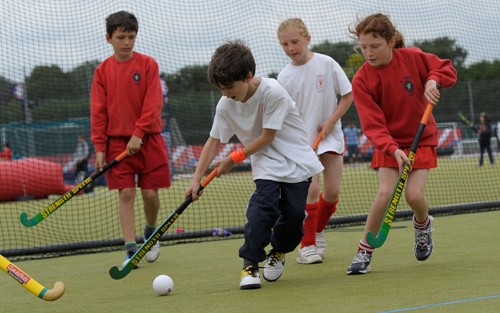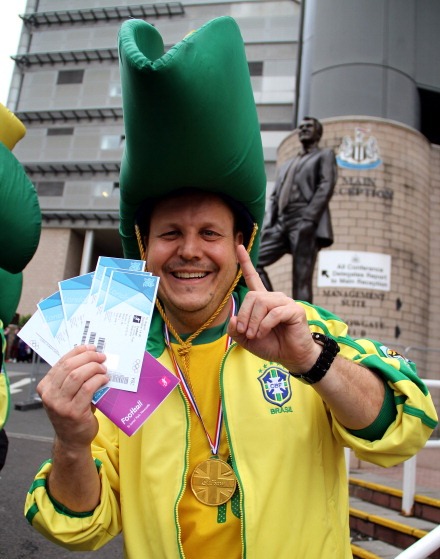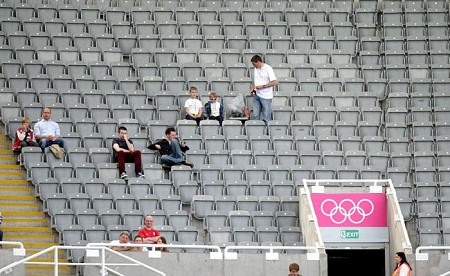Coe "frustrated" by school sports delays, Deighton denies lack of transparency over ticketing |
Back To Main |
16-Nov-2012
inside the games
By Mike Rowbottom at City Hall in London
 November 14 - London 2012 chairman Sebastian Coe told the London Assembly here today of his "frustration" at the lack of cross-party initiative in providing pupils at state schools with better sports provision, and joined his chief executive Paul Deighton in defending the Games organisers of a lack of transparency in its ticketing operation. November 14 - London 2012 chairman Sebastian Coe told the London Assembly here today of his "frustration" at the lack of cross-party initiative in providing pupils at state schools with better sports provision, and joined his chief executive Paul Deighton in defending the Games organisers of a lack of transparency in its ticketing operation.
Coe (pictured top, right), who now works in a Cabinet Committee dealing with Olympic legacy, which is chaired by Prime Minister David Cameron, was responding to a question from City and East London Assembly member John Biggs, asking what was the one thing he would have done differently in terms of his experience at London 2012.
He said he regretted the approach taken to school sport ahead of the Games, although stopped short of criticising the actions of Education Secretary Michael Gove in controversially cutting £162 million ($257 million/€202 million) in ring-fenced funding to support the national school network that allows PE specialists to work in schools.
These actions, which were partially revoked, caused fierce debate during the Olympics and Paralympics about how best to provide young people with sporting support and facilities.
"It is frustrating still to have this as a key area of discussion when we should be driving this part of the legacy forward," said Coe, who was making his last report to the Assembly in his role as London 2012 chairman.
"I wish we had approached the issue about school sport and sustainable school sport in the state system in a more consensual way.
"I find it frustrating that off the back of the sport we have witnessed, the role models that have emerged, that we are still discussing the future of school sport in the state sector."

Sebastian Coe insists the worth of school sport must be recognised
Acknowledging that Tessa Jowell, the former Shadow Olympics Minister, has called for a cross-party, 10-year plan for school sport, Coe added: "Figuring out with a grown-up, cross-party consensus how we deliver good quality physical education – and this is not a knock to any particular political party – we need to deal with this in a grown-up way.
"We are going to need to create space outside the school timetable for sport and recognise the worth of physical education teachers in the same way as we did when we needed to improve the quality of maths and science teachers."
Coe and Deighton (pictured top, left) were criticised by the London Assembly for failing to hand over all data relating to the breakdown of tickets by session and price point.
Instead, London 2012 produced a breakdown of the various price points by sport in an attempt to prove that they were roughly equally divided.
However, London Assembly members remained frustrated that they could not tell what the breakdown of tickets was for individual finals.
London 2012 also published details of how many tickets were made available under its "pay your age scheme" on a sport-by-sport basis.

More than a third of Olympic tickets sold under the "pay your age" scheme were for football events
Of the 639,777 tickets sold, more than a third - 255,404 - were for football.
While 50,870 were for athletics in the main stadium, only 839 were for the ceremonies and 1,972 for swimming.
On the subject of the ticketing process, Biggs told Coe and Deighton: "There was a perception that it was less than transparent, and that a lot of ordinary people - not wealthy people - wanted to get lower priced tickets, and that they didn't game the system effectively.
"That they lost out simply because they applied for what they wanted to go to and they didn't get the ticket, whereas someone down the road applied for 27 sessions and got a handful.
"The perception was that it was a sort of scatter-gun that won, or a deep pocket that won, and the promise to make tickets available for people of more modest means didn't really work, and in particular that there was a degree of, if you like, hoarding by people who applied for a lot of tickets which meant that other people did not get them."
Assembly member Stephen Knight pressed Deighton on the issue of providing full ticket data after the chief executive had declared: "Did we deliver all the things we said about tickets?
"The short answer to this is – yes, in every respect and at every level."
Knight said: "Given in your report to the assembly's Economy, Culture and Sports Committee on the 15th of February, when you were asked whether there would be a disproportionate number of higher priced tickets at the most popular events, and the answer was 'No, there would not be.'
"At all sports sessions, and I stress the word 'sessions' because it was your word, would have broadly the same number of tickets in each price band.
"Now in order to test that commitment we really do need to see the proportion of tickets for each session.
"So even if it is only published on your website I think it would answer the question.
"It is important for the public to be able to see the data for each session and each price band in order to see that that commitment has been met.
"What you have published today is the aggregate figures for sport and a few selected figures for a small number of sessions.
"When are you going to publish the full list for every session of the proportion of tickets sold at each price point?
"Because I think that's what the public has been expecting."
Deighton responded: "We have so much data.
"What we tried to do is give you information rather than a data dump.
"We tried to aggregate it so you could see the wood for the trees.
"You can come into our office we will go right through the database and you will see every ticket for every person.
"Believe me I'm not trying to hide it, we are trying to put it in a form which is intelligible.
 
Empty seats at some venues in the opening days of the Olympics saw London 2012 face considerable criticism
Knight added: "I appreciate that, but if you don't publish the whole set of data there will be those who will accuse you of publishing selective data – that's the concern."
Coe defended the pricing policy, comparing it favourably to Premier League football and the Rolling Stones playing at the O2 Arena.
Deighton insisted: "Nobody has ever filled up venues like this in the history of sport.
"This was a world-beating success."
Both men insisted that pricing of tickets had not been an issue with the public, with the primary concern having to do with availability.
And they added that the gaps which had been evident at venues in the opening days of the Games were down not to a failure in ticket sales, but to the mechanism upon which the International Olympic Committee (IOC) insisted whereby a proportion of seats had to be reserved for the media, National Olympic Committees, international federations and sponsors.
To read the full London 2012 report on ticketing  click here. click here.
Contact the writer of this story at mike.rowbottom@insidethegames.biz

|